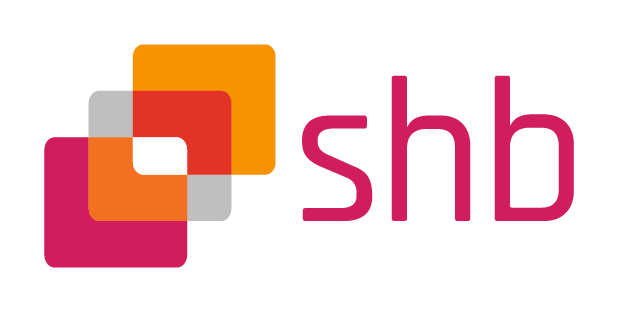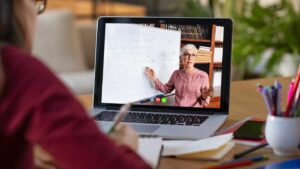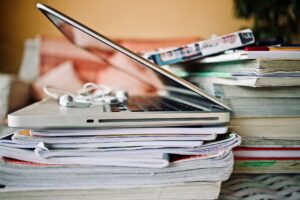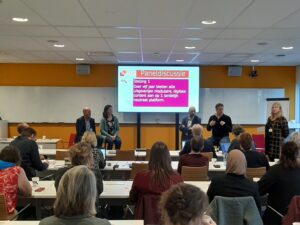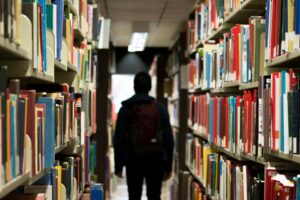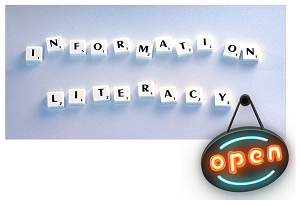About the working group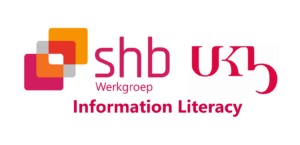
The UKB/SHB Information Literacy working group deals with all aspects of information literacy. Through collaboration and open sharing of knowledge and teaching resources, the aim is to raise support for information literacy to a higher level throughout the country.
The working group is an amalgamation of several former working groups on information literacy, including ‘Landelijk Overleg Onderwijs Wetenschappelijke Informatie (‘Dutch association for teaching information literacy’, LOOWI) of the Netherlands association of information professionals KNVI. The name LOOWI still exists, but the LOOWI forms part of the Information Literacy working group. There is more information on the LOOWI page.
The areas of focus are roughly as follows:
- Quality and standardization of the field of information literacy – examples include translating subject-related developments into actual teaching, didactics, assessments, and making the effectiveness of training courses quantifiable.
- Sharing and developing teaching resources
- Knowledge sharing (organization of events) and communication via the website
For more information about the ambitions, activities and planning of the working group, you can download the ambition plan 2021-2024 (Dutch) and the annual plan 2023 (Dutch). Larger themes are tackled as projects:
Running projects
Digital badges are digital certificates that demonstrate that a person has certain knowledge or skills. Information Literacy is one skill for which badges can be awarded.
If badges are cross-institutional, it becomes easier for students to continue their studies at another program or institution, making education more flexible. It can be efficient for institutions to participate in cross-institutional badges; once a system is set up, other institutions can join.
In preparation for the elaboration of the project, literature research was carried out on the most commonly used, related terms and concepts of badges in general, of the context and (foreign) relevant examples of badges in general + Information Literacy badges.
Furthermore, the criteria for enabling international exchange between badges were examined and there was a brief exploration of the practice of awarding edubadges across institutions via the SURF platform.
Main conclusion: consensus is needed around learning outcomes before institution-wide badges can be developed.
A number of working sessions were held, starting with an overview of the learning objectives per participating institution in relation to the Taxonomy. Then, based on the corresponding learning objectives, an overview was made with must haves and nice to haves for each part of the Information Literacy Taxonomy.
This resulted in a framework of learning outcomes (learning outcomes matrix), which serves as the basis for cross-institutional Information Literacy edubadges. From this framework, sample badges have been designed for levels 1, 2 and 3. Institutions can use these for inspiration for their own badges, but not on behalf of Information Literacy.
This is because good, cross-instititutional aligned assessment is needed for a badge to be of good value. A follow-up project is needed to achieve good and feasible assessment together.
Preconditions
|
Theme |
Content |
Explanation |
|
Level classification |
Dreyfus model of skill acquisition
|
See Appendix 2 of the Final Report for a visualization of the framework showing only the must haves See Appendix 3 of the Final Report for the learning outcomes matrix |
|
Formeel/informeel |
Formal/informal |
As Information Literacy is generally not a separate part of the curriculum and no formal assessment takes place, we chose to design extracurricular badges |
|
Way of issuing |
1 "parent badge" that individual institutions can copy and issue on behalf of the Information Literacy consortium. More information, see Appendix 1 of the Final Report. |
The desire was to award cross-institutional Information Literacy badges on behalf of the consortium. As there are many obstacles in this, this is not possible via the SURF platform Therefore, the recommendation is to create sample badges that affiliated institutions can copy for use within the institution.. |
|
Assessment |
Level 1: optional multiple choice - educational scoring rubric Level 2: assessment - educational scoring rubric Level 3: assessment - educational scoring rubric |
Additional requirements: Level 1: assessment based on a rubric to be developed Level 2: assessment based on a rubric to be developed Level 3: assessment based on a rubric to be developed |
For detailed explanation, see Final report below.
- Advice cross-institutional Edubadges Information Literacy (For institutions interested in joining)
- Final report project Edubadges Information Literacy (extended report + background information)
- Literature research Digital (open) badges general – follows
- Literature Research: Information skills & badges - follows
This project is a joint project (under construction) of the Information Literacy (SHB/UKB), Digital Scholarship (UKB), Research Data (UKB) and HBO-DCC working groups in collaboration with the Human Capital zone of the Educational Innovation Acceleration Plan with IT and Surf. Through this collaboration we try to create the largest possible support for sharing and reuse and a broadly supported professional vocabulary that serves as a basis for sharing. The aim of the project is to contribute to the quality of education aimed at learning digital competencies by sharing and reusing educational materials.
Finished projects
The APA7 project team has worked hard to create a large number of educational materials to support education and research. The results are impressive. In addition to the third revised edition of 'De APA-richtlijnen uitgelegd' ('The APA Guidelines Explained' Dutch publication by the APA Working Group), a lib guide has been developed and a number of short knowledge clips that can be found on You Tube and Copyright.nl.
Project APA7 is part of the UKB/SHB Information Literacy Working Group in collaboration with the APA (SHB) working group and consists of nine information specialists from higher education: Arjan Doolaar (HAN University of Applied Sciences), Annelies Kuijten (Avans University of Applied Sciences), Alie Mud (Stenden University of Applied Sciences), Rensje Wicherson (Windesheim), Marijke Mentink (Van Hall Larenstein), Yvonne Schuling and Monika Sieron (Hanze University of Applied Sciences Groningen), Daniela Hesmer (Amsterdam University of Applied Sciences) and Noor Breuning (University of Amsterdam).
Open learning is becoming increasingly important. This is especially the case now that online and digital lessons are the rule rather than the exception. It is particularly useful to have access to good-quality teaching resources, preferably ones that can be easily adapted.
In this project, information literacy teaching resources are shared openly on SURFsharekit and the Surf search portal, Edusources. The aim is to promote the sharing and reuse of resources and thereby improve its quality and, by extension, the quality of information literacy teaching; it will also make the process of providing training courses more efficient. An information literacy taxonomy has been developed based on a comparison of the most important IL frameworks, with a view to making the findability of resources as easy and efficient as possible.
Not all resources are automatically included. There are minimum requirements in relation to subject matter, didactics, presentation and language. The project group has developed an information literacy quality model for this.
There are many opportunities for using teaching resources in your own teaching. The Open Educational Practices serve as a guide for this. You can find them on the subject community page in the search portal. A number of useful teaching resources are also highlighted and explained on the same page.
The institutes taking part in the project are: Hanze University of Applied Sciences, Rotterdam University of Applied Sciences, Amsterdam University of Applied Sciences/University of Amsterdam, Radboud University, Maastricht University, Tilburg University, Eindhoven University of Technology, Vrije Universiteit Amsterdam, Van Hall Larenstein University of Applied Sciences, and Wageningen University & Research.
Documentation:
- Projectplan Open Informatievaardigheidsonderwijs (Dutch)
- Projecteindrapport project open informatievaardigheidsonderwijs (Dutch)
More information: Harrie van der Meer (h.a.l.van.der.meer@hva.nl)
Producing good-quality exam questions takes a lot of time and expertise. So how useful would it be to be able to use each other’s questions in a subject community? 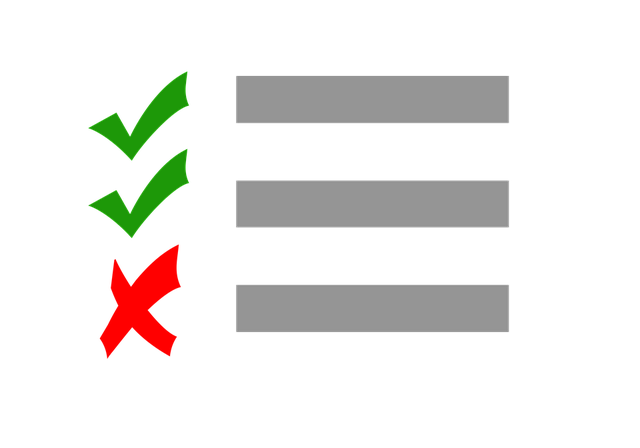
The Sharing Exam Questions project sees information literacy exam questions being shared at national level. The aim is to give a quality and efficiency boost to information literacy assessments (both formative and summative). Sharing exam questions will lead to an increase in supply, while the visibility of questions is expected to lead to greater attention to their composition and to a boost in the quality of the questions. Reusing each other’s questions will also result in greater efficiency - after all, it will mean not having to reinvent the wheel.
The Remindo test platform has been selected for sharing questions. It will be very easy to import questions from other exam question databases or indeed to export them using Remindo.
An information literacy exam questions quality model has been developed for evaluating and selecting exam questions. The quality model is also a handy tool for reviewing exam questions that are not yet of the required standard.
Additional information
Scheduled availability of exam questions: june 2021
Find more information about planning and activities in the project plan. (Dutch)
Participants of this project:
- Alie Mud (NHL Stenden Hogeschool)
- Annemarie Laport (Saxion Hogeschool)
- Brenda Lems (Hogeschool Rotterdam)
- Dorien van Mulukom (Hanzehogeschool)
- Mariëtte Vissers (Avans Hogeschool)
- Monique de Bont (TU Delft)
- Rian Kriesels (VU Amsterdam)
- Frea Haandrikman (vanaf febr. 2021 - Erasmus Universiteit Rotterdam)
Would you like to share your institute’s exam questions? Or would you like more information? Brenda Lems: : b.y.lems@hr.nl
Members
The Information Literacy working group consists of twelve members who work very closely together towards reaching its objectives. They are supported by representatives of all the libraries at Dutch institutes of higher education, who actively contribute to the working group and attend its meetings every two years. The core team consists of:
- Martijn Kleppe (UKB liaison – Koninklijke Bibliotheek)
- Gerdie Limonard (SHB liaison – Hogeschool van Amsterdam)
- Harrie van der Meer (Chairman – Universiteit van Amsterdam/Hogeschool van Amsterdam)
- Monique Schoutsen (Deputy chairman – Radboud Universiteit)
- Lieke Haverkort (Secretary – Politieacademie Apeldoorn)
- Henriëtta Hazen (Universiteit Maastricht)
- Leonie Kamminga (Wageningen University & Research)
- Kim Dibbets (Vrije Universiteit)
- Marie-Louise Goudeau (Universiteit Utrecht)
- Nikki Hooijerink (Hogeschool Arnhem en Nijmegen)
- Maaike Verweij (Hogeschool Utrecht)
- Dorien van Mulukom (Hanze Hogeschool)
- Nerissa Denswil (Amsterdam UMC)
- Simone Kloetstra (NHL Stenden Hogeschool)
- Mariëtte Vissers (Avans Hogeschool)
- Brenda Lems (Hogeschool Rotterdam)
For questions for the Information Literacy working group: Informationliteracy.nl@gmail.com
